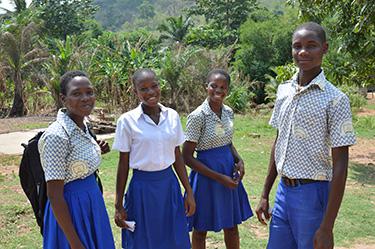
For the past 25 years, the Ho SDA School in Ghana’s Volta region has had no toilets on campus. The situation forced students and teachers to find their own ways to manage without these facilities, creating issues with both sanitation and attendance at the school. But a new urban sanitation project is underway in Ho, finally bringing these long overdue ‘places of convenience’ to the school.
A place of convenience, lavatory, restroom, toilet facility, washroom, comfort station. These are all names used in Ghana to describe a toilet or bathroom. But when these facilities are unavailable – especially for children in schools – it can be anything but comfortable or convenient.
The Ho SDA School complex in Ghana’s Volta region was built 25 years ago, and it has never once had toilets. Students have been forced to find their own ways to manage without these facilities.
“I make sure that I do everything that makes me comfortable before I come to school”, says 16-year-old Abraham Aziaku, the boys’ prefect of the school.
A challenge for students and teachers alike
Abraham has learned to manage in the four years that he has been in the school, and he is fortunate to have a toilet in his home. Not all his school mates have this option. The younger children especially can find it difficult to control themselves.
“When the younger ones are pressed, sometimes they resort to defecating anywhere on the campus and even sometimes mess themselves”, Abraham says. Nancy Sappah, a primary one teacher corroborates Abrahams comment.
“The compound of the school was like a toilet facility and the odour, especially when the sun was high, made teaching and learning difficult. In fact, behind my classroom was the place of convenience.”
The situation accounted for some lost time in school for both students and teachers. Students would often seek permission to use the public toilet, which was a 15 minute walk from the school, and sometimes used that as an excuse not to return to school.
Some teachers would stay at home when they had stomach problems, or they would come to school and be forced to use toilets in the surrounding neighbourhood, which are usually dirty and unhygienic.
A country-wide issue
Only 15 per cent of Ghana’s population has access to improved sanitation – far from meeting Sustainable Development Goal 6 to ensure access to water and sanitation for all. Ho is an urban town and the capital of the Volta region, but it still faces many obstacles to providing universal access to sanitation.
Rapid urbanization, space constraints, insufficient enforcement of laws and the absence of a national sanitation strategy are some of the causes of the poor sanitation situation in the Ho district. Several schools have zero access to sanitation facilities or have facilities that do not meet the Ghana Education Services minimum standards.
However, thanks to support from UNICEF and the Government of the Netherlands, the Ho SDA School Complex recently commissioned two new blocks of four-seater Kumasi Ventilated Improved Pit (KVIP) toilet facilities with disability-friendly space and a room for managing menstrual hygiene.
The toilets are one of several holistic targeted interventions to improve sanitation in Ho, with a view to develop a national urban sanitation strategy.
Children as agents of change
Seventeen year old Happy Gomado is particularly grateful for the toilets at school because she does not have a bathroom in her home. “I have trained myself not to go when I am in school, but since this came, I feel so happy and excited”, she says.
Although she is still waiting for her system to adjust to using the toilets at school, she has used the girls’ changing room. “I felt very comfortable in the room all by myself as I changed.”
By using schools as entry points, the urban sanitation project is harnessing the power children have as agents of behaviour change in their communities. Over time, the students will share with their families and neighbours all of the knowledge they have gained on sanitation and proper use of the facilities.
As Ho begins to enjoy the benefits of a clean community, Happy, Abraham and all the children at the Ho SDA School have the opportunity to make a permanent impact on the future of their town. In fact, Abraham has already noticed a difference: “Since the toilets were opened, our campus is cleaner and more hygienic.”
Source: UNICEF
 FR
FR EN
EN AR
AR








